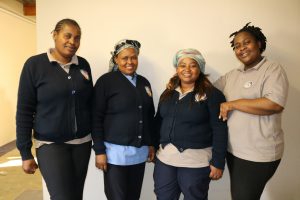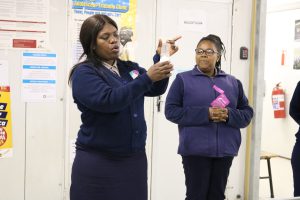Youth Alive: A New Programme Tailored for Adolescents
South Africa has the largest HIV burden globally with about 7.1 million people living with HIV. The country also has the biggest treatment programme in the world, with more than four million people on lifesaving anti-retroviral therapy. South Africa is also home to mothers2mothers (m2m) global headquarters and is where the first m2m Peer Mentor programme was launched 18 years ago.
While South Africa has made great strides towards the Global Goal of eliminating new HIV-infections by 2030, adolescent girls and young women (AGYW) remain disproportionately affected by the virus. Over 2,000 AGYW, aged 15 to 24, are newly infected with HIV every week in South Africa. Just as troubling, a large number of these young women do not know their HIV status.

Adolescent girls and young women listen attentively to a talk on sexual and reproductive health by m2m Mentor Mentors at the Site B Youth Clinic in Khayelitsha.
In low-income, high-density South African townships, such as Khayelitsha and Strand in Cape Town, HIV prevention efforts have been hampered by the many vulnerabilities and challenges faced by young women. These vulnerabilities, which are amplified by unequal cultural, social, and economic status, often take away their power to make decisions, especially when it comes to sexual activity. They become disempowered to say no to transactional sex and have limited access to education, both of which often go hand in hand with the abuse of drugs and alcohol. Added to this, many AGYW fear seeking sexual and reproductive health (SRH) services at health facilities which are run by nurses who are their parents’ peers and who may have disparaging and stigmatising attitudes towards them.
To combat these challenges and barriers, m2m has launched a new project, Youth Alive, specifically tailored to the needs of AGYW in Khayelitsha and Strand. This two-year project was made possible by generous support from Comic Relief. The project’s main goal is to reduce new HIV infections and HIV-related illnesses and deaths among AGYW aged 15 to 24 years. This is being done through empowering AGYW with knowledge to make informed decisions about their sexual and reproductive health and life choices as well as by helping to build relationships and improve communication between parents and their adolescent girls.

Mentor Mothers at an m2m site in Nomzamo, a township outside of Cape Town.
Building on m2m’s established peer model, Youth Alive Peer Mentor Mothers are based in both communities and health facilities. In health facilities, Peer Mentor Mothers are strategically placed in youth clinics and other service points where youth access services. They play a key role in educating young women on SRH/HIV treatment and prevention as well as helping them navigate and access appropriate services. They educate young women about different forms of contraception available in the clinics, benefits of and correct use of male and female condoms, and the importance of testing for HIV and other sexually transmitted illnesses. In addition, Peer Mentor Mothers conduct follow up household visits in surrounding communities to help create an enabling environment that promotes knowledge and awareness, improves life skills and the adoption of healthy behaviours, and increases access to youth- friendly sexual and reproductive health services.
Through the Sinovuyo parenting groups, Youth Alive also provides a platform for engaging parents and caregivers, promoting responsive parenting, and improving sexual and reproductive health knowledge and awareness, attitudes, and social norms among parents/caregivers. Experiences from the parenting groups will help to shape the beliefs, attitudes, and values of young people, and with an increased adolescent-caregiver communication channel around core topics, can influence behaviour for positive health outcomes.

m2m Mentor Mothers give a demonstration during a support group session for adolescents and young women at the Site B Youth Clinic in Khayelitsha.
“We make our health education sessions interactive and fun for young women so they feel as part of the conversations. As we are all young ourselves and have first-hand experience of HIV as an adolescent, we can connect to our clients. It is important for us to treat the young women we work with as equals so they feel comfortable asking us the kinds of questions they would never ask their parents or other healthcare workers,” said Phumeza Dyantyi, a Mentor Mother at Site B Youth Clinic in Khayelitsha.
Zikhona Mongameli, a Mentor Mother from Michael Mapongwana Health Centre, also in Khayelitsha, reiterated the importance of taking their services to the community: “We run support groups in the communities to encourage adolescent girls and young women to go to clinics to access healthcare. We also run parenting sessions, where we have groups of AGYW together with their parents to help foster communication and interpersonal relations between the pairs.
“We fully understand that working with adolescents is different to working with older women. That is why we take our services to them in the comfort of their own homes and communities. We also know that while adolescents often want to be treated as adults, they are still children to their parents, which is why building healthy relationships between them is essential. Having stronger relationships with their parents encourages young women to make better decisions and stay in school.”






















